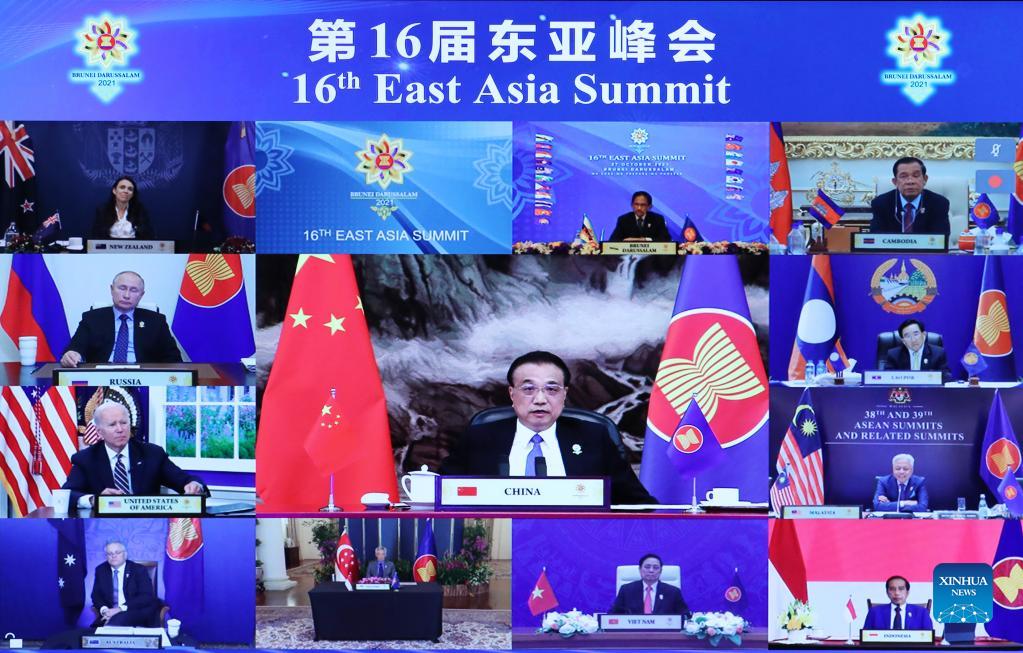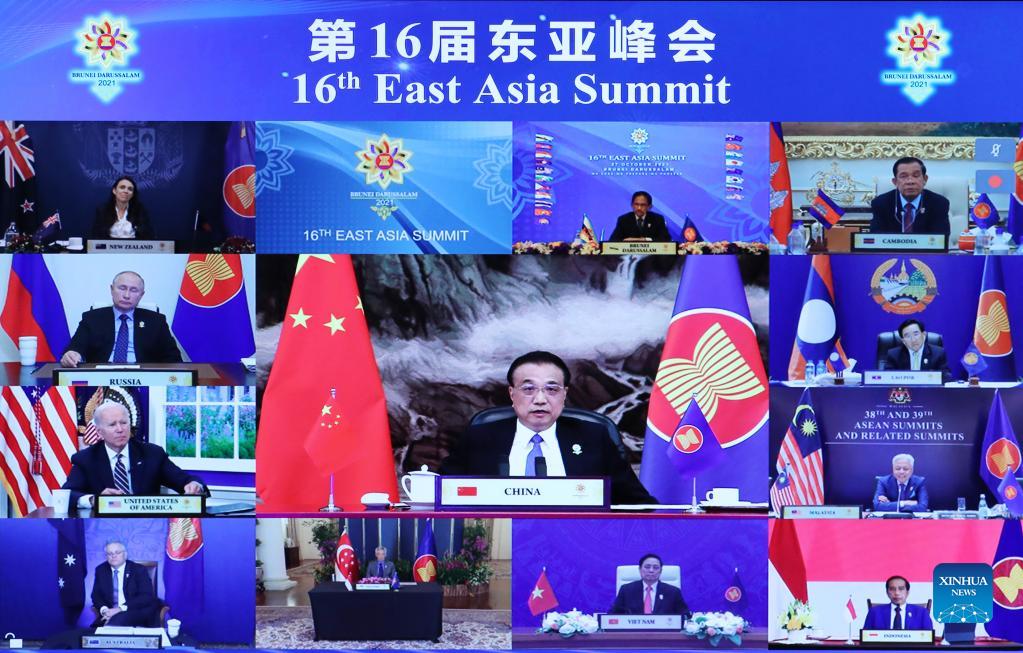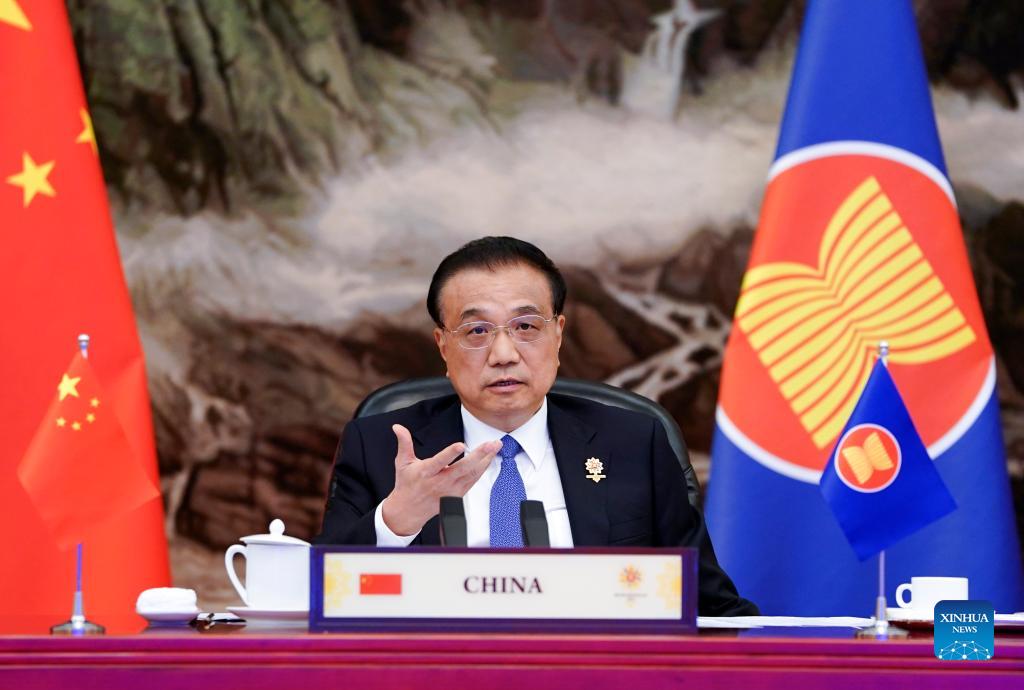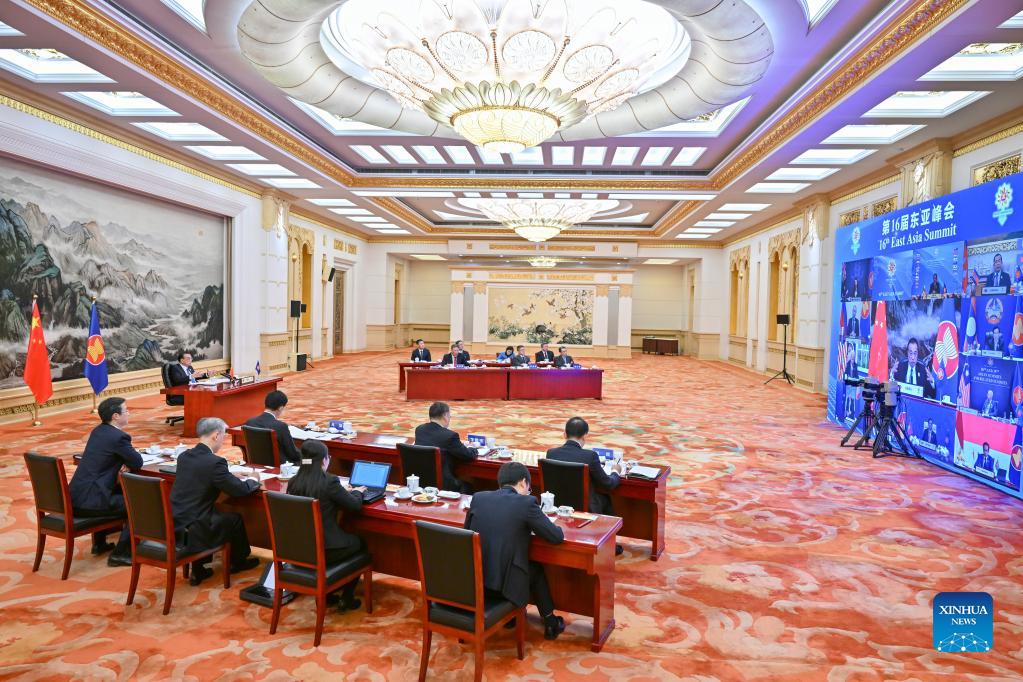Chinese premier proffers four-point proposal on East Asia cooperation

Chinese Premier Li Keqiang attends the 16th East Asia Summit via video link at the Great Hall of the People in Beijing, capital of China, Oct. 27, 2021 (Xinhua/Yao Dawei)
Chinese Premier Li Keqiang on Wednesday attended the 16th East Asia Summit, and put forward a four-point proposal in encouraging relevant parties to respect each other, work together, increase their input on fighting COVID-19 and economic recovery, uphold regional peace and stability, and promote development and prosperity.
Noting that the Summit is a "leaders-led strategic forum" with members from the major Asia-Pacific countries, and provides both representation and influence, Li said that East Asia needs to push forward synchronously the fight against the COVID-19 pandemic and economic recovery to continue injecting impetus into global development.
He pointed out that the Summit should always stick to its own orientation, keep regional cooperation pointed in the right direction, and promote political and security cooperation with economic and social development in a balanced way. He added that mutual respect for sovereignty and territorial integrity is a basic norm governing international relations and an important guiding principle of the Summit.
Li then put forward a four-point proposal:
First, all parties should join hands to fight the pandemic. China will scale up vaccines and other anti-pandemic supplies to the best of its ability, according to the needs of relevant countries, and will accelerate the initiative of China-ASEAN public health cooperation to enhance the regional public health capacity, Li said.
Second, all parties need to promote all-around economic recovery, uphold free and fair trade, and ensure unimpeded international logistics. Efforts must be stepped up to push for the early entry into force and implementation of the Regional Comprehensive Economic Partnership (RCEP).
China has formally applied to join the Comprehensive and Progressive Agreement for Trans-Pacific Partnership (CPTPP), which will further enhance its commitment to opening-up. China will also support the efforts of countries in the region to revive tourism, said Li.
Third, all parties should promote green development, respond to the challenge of climate change in accordance with the principle of common but differentiated responsibilities, fully and effectively implement the Paris Agreement, promote low-carbon transformation in a balanced and orderly manner, and achieve synergies with economic development and people's livelihoods, while ensuring a stable and secure energy supply, said Li.
Fourth, all parties should support the centrality of ASEAN. Li stressed that an open and inclusive regional cooperation architecture, with ASEAN at its center, is an important cornerstone for long-term peace and prosperity in the region.
He said that all parties should support the building of the ASEAN community and its efforts to maintain multilateralism and uphold the international system with the United Nations at its core.
Myanmar is an important participant in East Asia cooperation. China supports ASEAN in properly handling relevant issues in the "ASEAN way", promoting ASEAN unity, regional stability and Myanmar's peace and reconciliation process, according to the premier.
Stressing that the South China Sea is a common home for all parties, Li said that maintaining peace and stability and freedom of navigation and overflight in the South China Sea serves the common interest.
"Thanks to the joint efforts of China and ASEAN countries, the overall situation in the South China Sea has remained stable," Li said.
China and ASEAN countries have agreed to reach effective, substantive regional rules at an early date, and are fully and effectively implementing the Declaration of the Conduct of Parties in the South China Sea (DOC). The two sides have overcome the impact of the pandemic, and have substantially resumed and actively promoted consultations on the Code of Conduct in the South China Sea (COC), Li said.
He stressed that the efforts made by regional countries on maintaining peace and stability in the South China Sea should be respected, and said that China is ready to work with all parties to strengthen solidarity, expand cooperation, promote common development, achieve prosperity and stability and write a new chapter in East Asia cooperation.
Attending the meeting were the leaders of ASEAN countries, together with Russian President Vladimir Putin, Republic of Korea (ROK) President Moon Jae-in, U.S. President Joe Biden, Japanese Prime Minister Fumio Kishida, Indian Prime Minister Narendra Modi, Australian Prime Minister Scott Morrison and New Zealand Prime Minister Jacinda Ardern.
The leaders at the meeting noted that, since last year, Summit member states have continuously promoted cooperation in areas including health, economy and trade, energy, oceans, education and green development, and have achieved positive results.
They said that global challenges such as the COVID-19 pandemic and climate change cannot be met alone. All parties should operate in the spirit of common focus, common response and common prosperity to uphold multilateralism, promote the equitable distribution of vaccines and medicines, strengthen cooperation on the digital economy, free trade, public health and climate change.
All parties should also keep industrial and supply chains stable and smooth, and deepen regional economic integration, the leaders said.
They expressed their willingness to respect ASEAN centrality and the ASEAN-led regional cooperation framework and work together to promote peace and prosperity in the region and the world.





